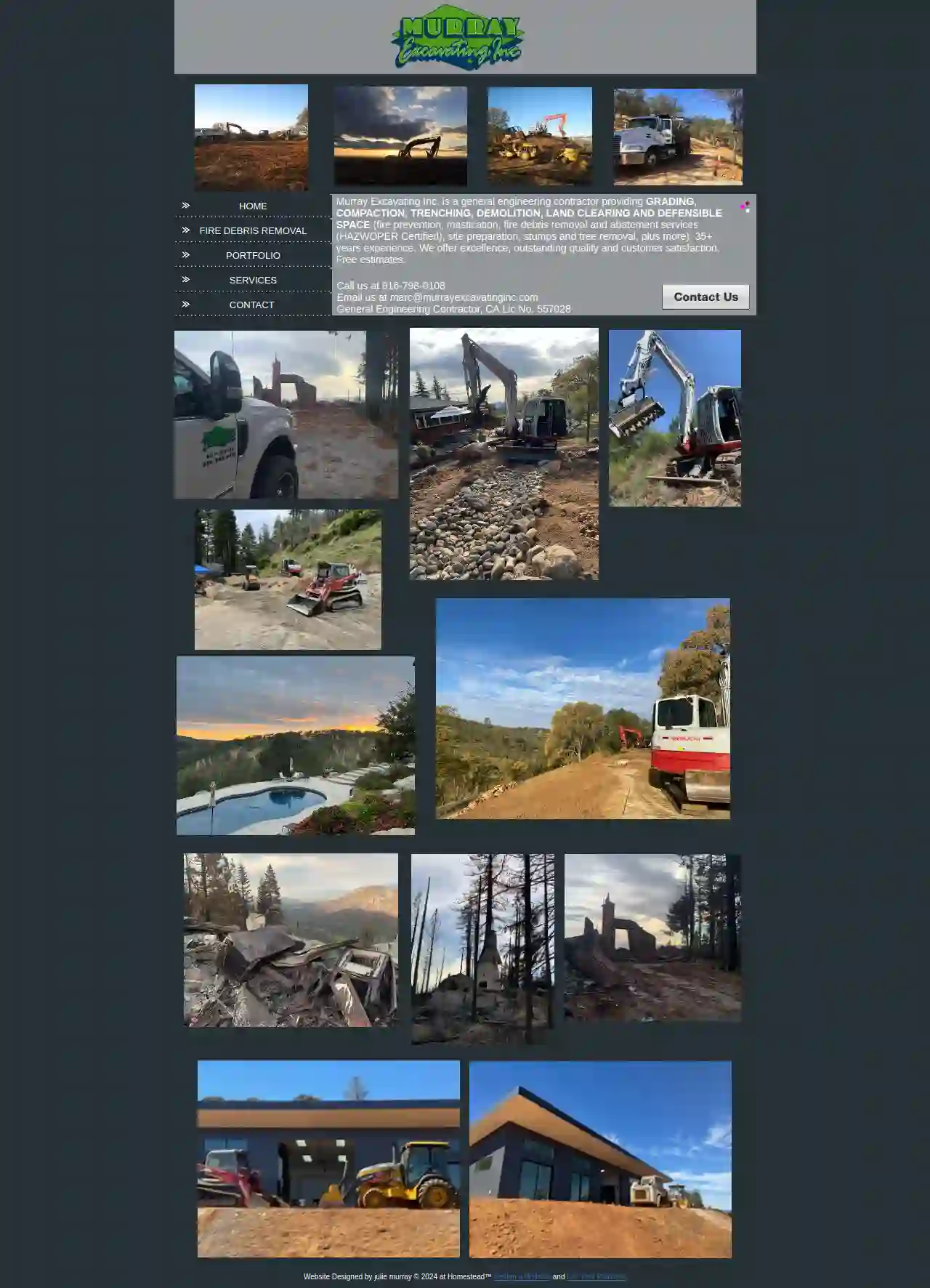Demolition Contractors Foothill Farms
Find Demo Contractors in Foothill Farms
Get 3 FREE Demolition Experts quotes for your project today! Compare profiles, reviews, accreditations, portfolio, etc... and choose the best service.

Murray Excavating Inc. Backhoe Service, Excavating and General Engineering Contractor
51 reviewsLatrobe, CA, 95682, USAbout Murray Excavating Inc. Murray Excavating Inc. is a general engineering contractor with over 35 years of experience, specializing in a wide range of services including grading, compaction, trenching, demolition, land clearing, and defensible space preparation. We are committed to providing excellence, outstanding quality, and exceptional customer satisfaction. Our team is HAZWOPER Certified and equipped to handle projects of all sizes, from small residential properties to large-scale commercial developments. We understand the importance of fire safety and have extensive experience in fire debris removal and clean-up. We have worked on major fire events such as the Caldor, Santa Cruz, NAPA, and Paradise Fires, providing comprehensive services that include debris removal, demolition, utility capping, and erosion control. Our goal is to restore your property to a safe and usable condition, while ensuring compliance with all federal and local regulations. Beyond fire-related services, we offer a comprehensive range of solutions for land development and improvement. Our services include brush clearing, mastication, fuel reduction, and land reclamation for various purposes such as recreation, grazing, access, and new construction. We are dedicated to helping you create a safe and sustainable environment for your property. Our team is equipped with a wide range of heavy machinery, including skip loaders, backhoes, excavators, masticators, mowers, dozers, compactors, and 10-wheelers, allowing us to handle any project efficiently and effectively. We are committed to providing our clients with the highest level of service and expertise, ensuring their complete satisfaction.
- Services
- Why Us?
- Gallery
Get Quote
Souza Construction & Electric
52 reviews586 So. Farmersville Blvd., Farmersville, 93223, USSouza Construction Inc. is a growing construction business, striving ever forward to become a premier general contractor. From our beginning as a “one-man show”, until our present state as a “multi-faceted” team, one thing has remained constant, a commitment to customer service. It is this commitment that has helped Souza Construction Inc. nearly double its sales every year for the last four years. We firmly believe that it will be this continuing commitment that will assist us in continuing this phenomenal growth pattern. Essential to this excellent service are our capabilities as a builder and a business. THE SOUZA COMMITMENT Souza Construction Inc. has committed itself to recruiting and training leaders in both the construction and professional world. Assembling a team of this caliber is not a quick or simple process, but requires diligent research, highly refined discernment, and continuous assessment. However, it is just this level of commitment and attention to detail that sets us apart. Souza Construction Inc. has made this our primary goal: understanding our customers and their needs, utilizing excellence in the field and in administration, and combining this with an unwavering commitment to customer satisfaction; this is Souza Construction Inc.
- Services
- Why Us?
- Testimonials
- Gallery
Get Quote
Atkinson Land Leveling
51 reviewsDixon, 95620, USAtkinson Land Leveling: Your Trusted Partner for Land Development Atkinson Land Leveling is a family-owned and operated business serving Solano, Yolo, Napa, Sacramento, El Dorado, San Joaquin, and Colusa Counties. We specialize in a wide range of land development services for residential, commercial, and agricultural clients. Our commitment to quality, efficiency, and customer satisfaction has made us a trusted name in the industry. We understand that every project is unique, and we work closely with our clients to ensure their vision is realized. Our team of experienced professionals utilizes state-of-the-art equipment to deliver exceptional results on every job. Whether you need laser land leveling, excavating, discing, vineyard removal, earth moving, ditch cleaning, or any other land development service, we have the expertise and resources to handle it. At Atkinson Land Leveling, we are dedicated to providing our clients with the highest level of service and support. We are committed to safety, environmental responsibility, and exceeding expectations. Contact us today to discuss your project and learn how we can help you achieve your goals.
- Services
- Why Us?
- Gallery
Get Quote
The Fort Lauderdale Excavating Company
51 reviewsOakland, USWelcome to The Fort Lauderdale Excavating Company We take great pride in pioneering excellence in excavation services. With a steadfast commitment to quality, safety, and client satisfaction, we have emerged as a leading excavating company in Fort Lauderdale, Illinois. Our journey of over two decades has been marked by innovation, a highly skilled workforce, and state-of-the-art equipment, making us the go-to choice for a wide range of excavation and site preparation needs. As we share our story with you, we invite you to explore the core values that drive us, the comprehensive services we offer, and our unwavering dedication to delivering outstanding results. Our Foundation and Values From the outset, we embraced a set of core values that became the guiding principles of our company: 1. Integrity: We operate with utmost honesty and integrity, building trust with our clients, partners, and employees. 2. Excellence: Striving for excellence is at the heart of everything we do. We are committed to delivering top-quality workmanship that exceeds expectations. 3. Safety: The safety of our team members and clients is of paramount importance. We uphold rigorous safety standards and invest in continuous training to prevent accidents and create a secure work environment. 4. Innovation: Embracing innovation is key to our success. We continuously explore new technologies and techniques to improve our services and efficiency. 5. Client-Centric Approach: Our clients are at the center of our operations. We listen to their needs, collaborate closely, and tailor our services to meet their specific requirements. Comprehensive Excavation Services At The Fort Lauderdale Excavating Company, we offer a comprehensive suite of excavation services designed to address the diverse needs of our clients. From small-scale residential projects to large commercial ventures, we have the expertise and resources to handle projects of varying complexities. Our services include: 1. Site Preparation: Our site preparation services set the stage for successful construction projects. We clear debris, grade the land, and prepare the site for the construction process. 2. Earthmoving: With our modern fleet of excavators and bulldozers, we efficiently move earth to create the desired landscape for construction. 3. Land Clearing: Our land clearing services ensure that your site is free from overgrowth, obstacles, and debris, allowing for a clean canvas to begin construction. 4. Grading: Precise grading is essential for a stable and level foundation. Our skilled operators use advanced equipment to ensure accurate grading for your project. 5. Trenching: We specialize in trenching for utilities, drainage systems, and other infrastructure projects. Our team carefully excavates trenches to the required depth and width, ensuring proper installation and safety. 6. Utility Installation: We provide comprehensive utility installation services, including water, sewer, gas, and electrical lines. Our experienced team handles all aspects of utility installation, from excavation to backfill and restoration.
- Services
- Why Us?
- Gallery
Get Quote
Granite Construction Co
4.618 reviews585 West Beach Street, Watsonville, 95076, USGranite Construction: Building a Better Future Granite is a diversified construction and construction materials company, serving as a full-suite provider in the transportation, water infrastructure, and mineral exploration markets. We deliver Infrastructure Solutions for public and private clients throughout the Americas. Our Commitment At Granite, we are committed to building a better future. We believe in building better together, building value together, and building safely together. Our Values Our core values guide everything we do. We are committed to: Safety Integrity Excellence Innovation Sustainability Our History Granite has a long and rich history, dating back to 1922. We have a proud tradition of building quality infrastructure that stands the test of time. Our Team Our team is made up of some of the most talented and experienced professionals in the industry. We are committed to providing our employees with the resources and support they need to succeed.
- Services
- Why Us?
- Gallery
Get Quote
Lenax Construction Services, Inc.
4.817 reviews3700 Wilshire Blvd., Suite 560, Los Angeles, 90010, USAbout LENAX Since its inception in 1993, Lenax Construction Services, Inc. (LENAX) has provided quality construction consulting services to a diverse range of engineering, design, construction firms, and public sector owners. We take pride in our history of repeat business directly with clients and owners, and we have established long-lasting professional relationships with many architectural, engineering, and construction management firms as consultants on larger project teams. LENAX provides professional support for a broad spectrum of projects and sectors, with a special focus on the Southern California region. With a history of consulting from different perspectives - we have worked as consultants to architect/engineers, owners, contractors and construction/program managers - we have flexibility in how we provide our services, and our overall management styles for the best fit with any specific client's needs. With corporate headquarters in Los Angeles, LENAX is a woman-owned consulting firm certified as a SBE/WBE/DBE/UDBE/CBE/LBE by the County of Los Angeles, Caltrans, Metro, and a number of other public agencies. LENAX is also recognized as a Small Business by the Small Business Administration.
- Services
- Why Us?
- Testimonials
- Gallery
Get Quote
Lowland Grading & Excavation LLC
58 reviewsAberdeen, USPrompt and Reliable We prioritize delivering results swiftly and dependably, all the while ensuring that we meet and exceed the expectations of our clients every time. Satisfaction Guaranteed At our core, we're a seasoned team driven by our expertise and know-how, dedicated to success. We are here to offer you not only ease, but absolute satisfaction.
- Services
- Why Us?
- Gallery
Get Quote
Advanced Pavers & Landscape
4.938 reviews9196 Cerrolinda Cir, Elk Grove, 95758, USAdvanced Pavers & Landscape: Your Sacramento Landscape Design Experts We are a family-owned and operated landscape & hardscape company dedicated to transforming your backyard into a private oasis. As a leading landscape contractor in Sacramento, we are passionate about adding value to our community by delivering professional landscape designs that meet our client's visions. At Advanced Pavers & Landscape, we believe in building lasting relationships with our clients. We are committed to providing exceptional customer service and high-quality workmanship. Our team of experienced professionals is dedicated to exceeding your expectations and creating a landscape you'll love for years to come. We offer a wide range of services to meet your needs, including: Landscape Design Pavers Patios Outdoor Walls Artificial Turf Fire Pits & Fireplaces Driveways And more! We are committed to using the highest quality materials and techniques to ensure that your landscape is built to last. We also offer a variety of financing options to make your dream landscape a reality. Contact us today for a free consultation. We would love to hear about your project and help you create the outdoor living space of your dreams.
- Services
- Why Us?
- Testimonials
- Gallery
Get Quote
critical path solutions llc
54 reviews109 Gillespie Street, Fayetteville, 28301, USBuilding Relationships Through Creative Design & Quality Construction. Critical Path Solutions LLC (CPS) is a Fayetteville based General Contractor organized to assist businesses with consulting and management services as well as construction needs. Our Mission is to guide our clients ideas from sketches to bricks and mortar while maintaining the highest level of professionalism, integrity, honesty and fairness in our relationships.
- Services
- Why Us?
- Gallery
Get Quote
Watson Backhoe & Septic Install Services
52 reviewsModesto, USWelcome to Watson Backhoe, serving the greater Modesto, California region for over 30 years! We offer a wide range of services for residential, agricultural, and commercial clients. Our team of experienced professionals is dedicated to providing high-quality work at competitive prices. We are fully licensed and insured, so you can rest assured that your project is in good hands. We are proud to serve the following areas: Modesto, Turlock, Merced, Riverbank, Oakdale, Empire, Waterford, Escalon, Ripon, Tracy, Manteca, Stockton, Lodi.
- Services
- Why Us?
- Our Team
- Gallery
Get Quote
Over 22,076+ Excavation Businesses onboarded
Our excavation contractors operate in Foothill Farms & surrounding areas!
ExcavationHQ has curated and vetted Top Excavation Contractors near Foothill Farms. Find a trustworthy contractor today.
Frequently Asked Questions About Demolition Contractors
- Safety: Experienced contractors have the knowledge, skills, and safety training to execute demolitions safely, minimizing risks to workers and surrounding areas.
- Efficiency: Contractors have the specialized equipment and expertise to complete demolitions efficiently, saving time and reducing project costs.
- Compliance: Reputable contractors are familiar with local regulations and permitting requirements, ensuring compliance and avoiding legal issues.
- Waste Management: Contractors have waste management plans to handle debris responsibly, including recycling and proper disposal.
- Liability Protection: Insured contractors protect you from financial responsibility for accidents or damages during the demolition process.
- Project Assessment: The demolition contractor evaluates the structure, site conditions, and project requirements.
- Permitting: Obtain necessary demolition permits from local authorities.
- Site Preparation: Secure the site, disconnect utilities, and remove any valuable or reusable items.
- Hazardous Material Abatement: Professionally remove asbestos, lead paint, or other hazardous materials if present.
- Demolition: Execute the chosen demolition method, bringing down the structure safely and efficiently.
- Debris Removal and Site Cleanup: Sort, process, and dispose of demolition debris responsibly. Clean up the site to prepare it for future use.
What is the difference between demolition and deconstruction?
Demolition: Typically involves bringing down a structure quickly and efficiently, often using heavy machinery and potentially explosives. The primary goal is to clear the site.
Deconstruction: Focuses on carefully dismantling a building piece by piece to salvage reusable materials. It prioritizes minimizing waste and environmental impact, often involving manual labor and specialized tools.
The choice between demolition and deconstruction depends on the project's objectives, budget, and environmental considerations.
What are the benefits of hiring a professional demolition contractor?
Can I do demolition myself?
What are the steps involved in a typical demolition process?
What is the difference between demolition and deconstruction?
Demolition: Typically involves bringing down a structure quickly and efficiently, often using heavy machinery and potentially explosives. The primary goal is to clear the site.
Deconstruction: Focuses on carefully dismantling a building piece by piece to salvage reusable materials. It prioritizes minimizing waste and environmental impact, often involving manual labor and specialized tools.
The choice between demolition and deconstruction depends on the project's objectives, budget, and environmental considerations.
What are the benefits of hiring a professional demolition contractor?
- Safety: Experienced contractors have the knowledge, skills, and safety training to execute demolitions safely, minimizing risks to workers and surrounding areas.
- Efficiency: Contractors have the specialized equipment and expertise to complete demolitions efficiently, saving time and reducing project costs.
- Compliance: Reputable contractors are familiar with local regulations and permitting requirements, ensuring compliance and avoiding legal issues.
- Waste Management: Contractors have waste management plans to handle debris responsibly, including recycling and proper disposal.
- Liability Protection: Insured contractors protect you from financial responsibility for accidents or damages during the demolition process.
Can I do demolition myself?
What are the steps involved in a typical demolition process?
- Project Assessment: The demolition contractor evaluates the structure, site conditions, and project requirements.
- Permitting: Obtain necessary demolition permits from local authorities.
- Site Preparation: Secure the site, disconnect utilities, and remove any valuable or reusable items.
- Hazardous Material Abatement: Professionally remove asbestos, lead paint, or other hazardous materials if present.
- Demolition: Execute the chosen demolition method, bringing down the structure safely and efficiently.
- Debris Removal and Site Cleanup: Sort, process, and dispose of demolition debris responsibly. Clean up the site to prepare it for future use.